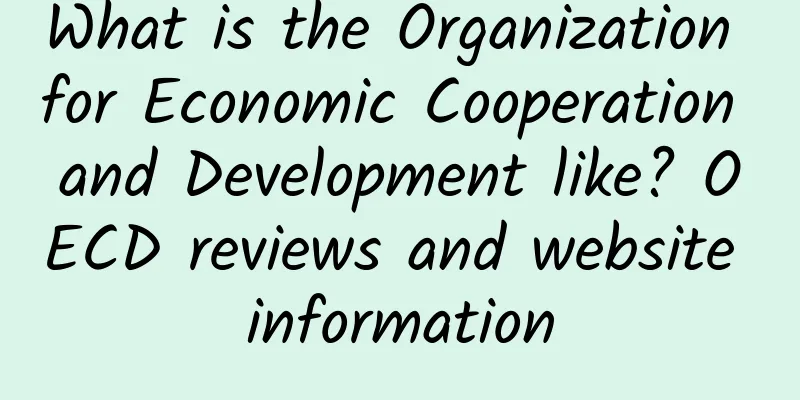What is the Organization for Economic Cooperation and Development like? OECD reviews and website information

|
What is the Organization for Economic Co-operation and Development? The Organization for Economic Co-operation and Development (OECD) is an intergovernmental international economic organization composed of market economy countries. It was established on September 30, 1961 and is headquartered in Paris. It currently has 34 member countries. The OECD aims to jointly respond to the challenges of economic, social and government governance brought about by globalization and seize the opportunities brought about by globalization. Website: www.oecd.org Organization for Economic Cooperation and Development (OECD): International Economic Cooperation Platform in the Era of GlobalizationIn the wave of globalization, countries are facing unprecedented opportunities and challenges. In order to better cope with these changes, an important international economic organization came into being - the Organization for Economic Co-operation and Development (OECD). As one of the most influential intergovernmental international economic organizations in the world, the OECD plays an irreplaceable role in promoting the economic development of its member countries, promoting policy coordination and improving social welfare. The OECD was established on September 30, 1961, and its history can be traced back to the European economic recovery plan after World War II. Initially, it existed in the form of the "Organization for European Economic Cooperation" (OEEC) to help rebuild the economy in post-war Europe. As the global economic landscape changed, the organization gradually expanded its membership and was officially renamed the "Organization for Economic Cooperation and Development" in 1961. Today, the OECD has 34 member countries, with its headquarters in Paris, France, and its official website is www.oecd.org . OECD's core mission and objectivesThe original intention of the OECD was to solve common economic problems through international cooperation and seize the development opportunities brought by globalization. Specifically, the core mission of the OECD includes the following aspects:
In order to achieve the above goals, the OECD has carried out a series of activities, including data collection and analysis, policy research, best practice sharing and technical assistance, etc. These efforts have made the OECD an important reference source for global policymakers. Main functions and activities of the OECDAs an institution focused on economic policy research and international cooperation, the OECD's work covers a wide range of areas. The following is a detailed introduction to its main functions and activities: 1. Data statistics and analysisThe OECD is known for its detailed statistical data system. By systematically collecting and analyzing economic, social and environmental data from its member countries and other countries, the OECD provides a scientific basis for policy making. For example, the World Economic Outlook report released by the OECD every year predicts the growth trend of the global economy in detail and analyzes various factors that may affect development. In addition, the OECD has developed many key indicators, such as the Better Life Index, to measure the quality of life in different countries. This multi-dimensional assessment method helps to understand the development status of various countries more comprehensively. 2. Policy research and recommendationsBased on a solid research foundation, the OECD regularly publishes various special reports covering taxation, trade, education, employment, innovation and other fields. These reports usually contain in-depth analysis of current issues and specific suggestions for future development. Taking education as an example, the OECD uses the famous "Program for International Student Assessment" (PISA) test to evaluate the academic performance of students in various countries and propose strategies to improve the education system based on this. This not only promotes the exchange of experience among member countries, but also provides valuable reference for non-member countries. 3. International Standards DevelopmentAs one of the makers of international rules, the OECD has established globally accepted standards in many areas. For example, in terms of anti-corruption, the OECD has formulated the Convention on Combating International Commercial Bribery, which requires member countries to take measures to prevent companies from bribing foreign officials. This convention has become an important tool for the international community to combat corruption. Similarly, in the field of taxation, the OECD has led the Base Erosion and Profit Shifting (BEPS) project, which aims to prevent multinational corporations from using tax loopholes to evade tax obligations. The project has been widely recognized and supported worldwide. 4. Technical assistance and capacity buildingIn addition to serving its member countries, the OECD also actively participates in technical assistance projects for developing countries. By providing training, consulting and financial support, the OECD helps these countries improve their policy-making capabilities and promote their economic and social development. For example, in Africa, the OECD and local partners jointly implemented the African Tax Administration Forum (ATF), which aims to strengthen the tax administration capacity of African countries. The successful implementation of such projects reflects the OECD's positive role in global governance. OECD's organizational structure and operating mechanismIn order to perform its duties efficiently, the OECD has established a complete organizational structure and operating mechanism. Its highest decision-making body is the "Council of Ministers", which is composed of the finance ministers or economic ministers of each member country and is responsible for determining the strategic direction and major decisions of the organization. The daily affairs are carried out by the Secretariat, whose current Secretary General is Ángel Gurría. The Secretariat consists of several professional committees and technical departments, each responsible for specific work in different fields. For example, the "Economic Policy Committee" focuses on macroeconomic policy coordination, and the "Education Committee" is committed to promoting global education reform. It is worth mentioning that the OECD's working method is highly flexible and inclusive. In addition to formal member countries, many non-member countries also participate in it as observers to discuss global issues. This open cooperation model enables the OECD to gather global wisdom and provide more possibilities for solving complex problems. OECD's achievements and influenceSince its establishment, the OECD has achieved many remarkable achievements and has had a profound impact on global economic and social development. The following are some typical examples:
In addition, the OECD has also played an important role in labor market reform, social security system construction, and public governance modernization. It can be said that the OECD is not only a bridge for communication and cooperation among member countries, but also an indispensable part of the global governance system. Future challenges and opportunitiesDespite its many achievements, the OECD still faces many challenges. First, with the rise of emerging economies, the global economic landscape dominated by traditional developed countries is changing. How to attract more developing countries to join and ensure that their interests are fully taken into account is a problem that the OECD needs to solve. Secondly, the application of new technologies such as digital transformation and artificial intelligence has brought new opportunities and risks to countries. The OECD must speed up its research and provide member countries with policy recommendations that meet the needs of the new era. Finally, global issues such as climate change and population aging are becoming increasingly serious, requiring the OECD to further strengthen cooperation with other international organizations to jointly find solutions. However, it is precisely these challenges that provide the OECD with new development opportunities. By constantly adjusting its own positioning, expanding research areas, and deepening international cooperation, the OECD is expected to continue to play its unique role in the future and contribute to building a more prosperous, just and sustainable world. ConclusionAs one of the most important international economic organizations in the world, the OECD has made great contributions to promoting global economic cooperation and development over the past half century. From data statistics to policy research, from standard setting to technical assistance, all of the OECD's work reflects its professionalism and foresight. Today, when we visit the official website of the OECD ( www.oecd.org ), we can not only obtain the latest economic trends and research results, but also feel the profound concern of this organization for the common future of mankind. Whether you are a policy maker, scholar or ordinary citizen, the OECD is an ideal platform for understanding global economic trends and learning advanced experience. Let us pay attention to and support the OECD and work together to create a better tomorrow! |
<<: What is Ferraiuoli LLC like? Ferraiuoli LLC reviews and website information
>>: How is Otsuka Pharmaceutical? Otsuka Pharmaceutical Reviews and Website Information
Recommend
What is the British Medical Journal like? British Medical Journal reviews and website information
What is the British Medical Journal website? The B...
The benefits and effects of celery juice
Celery is a very common vegetable. We can also ma...
The role and efficacy of chrysanthemum (Chrysanthemum chrysanthemum)
When it comes to chrysanthemum dish, many people ...
The benefits of drinking apple juice
Apple is a common fruit that can be eaten all yea...
The efficacy and function of Yili yogurt
Yili yogurt is a high-quality domestic dairy prod...
Corn breeding methods and precautions
Today I will tell you about the methods and appro...
Can cooked apples stop diarrhea?
Many people use boiled apple water to treat diarr...
What is CLUB JAPAN like? CLUB JAPAN reviews and website information
What is CLUB JAPAN? CLUB JAPAN is a Japanese shopp...
How to use essential oils and the effects of essential oils
Many people have heard of essential oils, but don...
How is Mozilla Firefox? Mozilla Firefox review and website information
What is Mozilla Firefox? Mozilla Corporation is a ...
What is Hobart and William Smith University like? Hobart and William Smith University reviews and website information
What is the website of Hobart and William Smith Un...
The efficacy and contraindications of yam beans
Yam bean is a type of yam, which is the above-gro...
What is the International Rowing Federation? International Rowing Federation reviews and website information
What is the website of the International Rowing Fe...
How to eat dragon fruit How to eat dragon fruit correctly
Dragon fruit is a good fruit. It tastes very refr...
How is JitterBug? JitterBug review and website information
What is JitterBug? JitterBug is a children's m...









